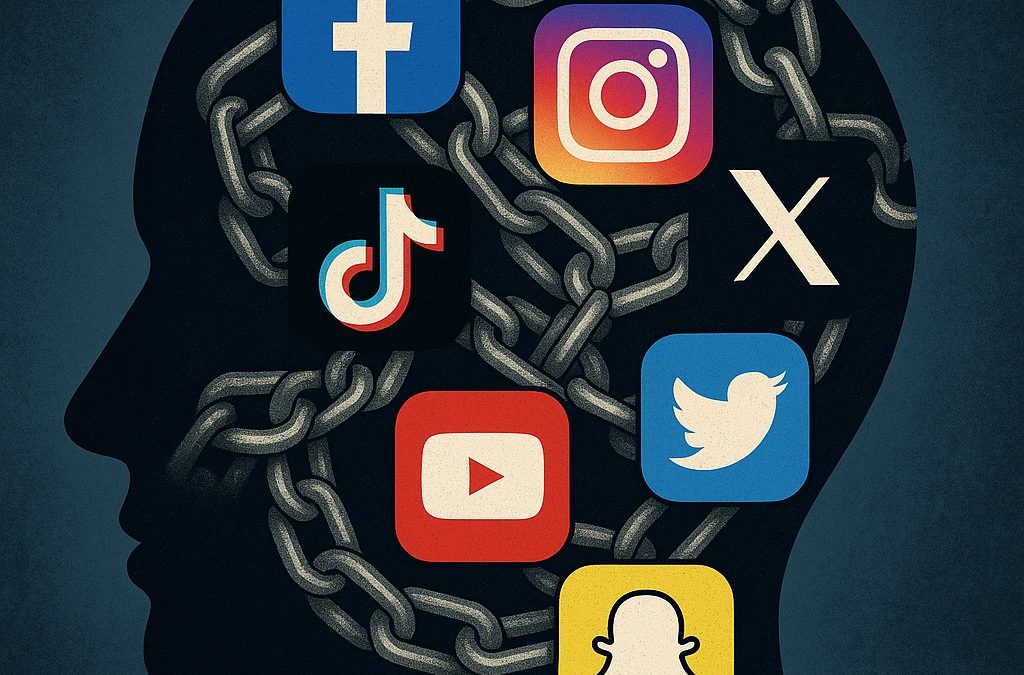
5 Sports Cars You Should Snag Now Before Prices Go Crazy (Thanks, Tariffs!)
April 26, 2025
The Quiet Crisis: Why So Many Feel Lost—and How to Fight Back
May 7, 2025Introduction: The New Addictions Aren’t Physical—They’re Cognitive
We’ve all heard the usual suspects when it comes to addiction: alcohol, opioids, gambling, pornography. But a far more subtle, sinister epidemic is unfolding before us—a society addicted not to substances, but to thought patterns.
An entire generation (and let’s be honest, many of us older folks too) is hooked on cognitive certainties that numb fear, validate prejudices, and keep anxiety temporarily at bay. Social media didn’t invent this addiction—it industrialized it.
And the psychological fallout? A spike in anxiety, depression, rage, and tribalism that dwarfs what my generation ever experienced.
I. The Brain’s Old Tricks in a New Arena
Humans have always craved:
- Belief validation (confirmation bias)
- Social belonging (approval addiction)
- Narrative simplicity (the “good guys vs. bad guys” lens)
These instincts evolved to help us survive in small, chaotic tribes. They made sense when the biggest threat was a neighboring clan or a sudden famine.
But now?
These same instincts are being gamified by trillion-dollar tech companies and weaponized by political demagogues.
Platforms like TikTok, Instagram, and X (Twitter) feed us the certainties we crave—tailored to our personal fears, fantasies, and prejudices. Every swipe, like, and comment strengthens the addiction.
II. The Modern Cocktail of Cognitive Addiction
Here’s what today’s minds are overdosing on:
| Craving | Modern Addiction Mechanism |
|---|---|
| Belief validation | Confirmation bias echo chambers |
| Social belonging | Approval and outrage addiction |
| Narrative simplicity | Conspiracy theories and identity politics |
| Sensory stimulation | Doomscrolling and novelty hunger |
| Self-comparison | Curated envy via influencer culture |
The most dangerous part?
Many people don’t even realize these are addictions. They think it’s just “keeping up with the world” or “having strong opinions.”
In reality, they’re stuck in reward prediction error loops—the same neural traps that hook gamblers and drug addicts.
III. Gen Z: The Most Anxious Generation—But Not by Choice
I was practically the poster child for anxiety in my generation. But what Gen Z faces makes my struggles look quaint.
Why?
- They’ve been digitally conditioned from childhood.
- Their brains are overexposed to cognitive stimuli their ancestors never evolved to handle.
- Identity itself is now performative and hyper-fragile.
Anxiety and depression aren’t personal failures—they’re logical responses to neurologically engineered overstimulation and certainty-seeking.
To be young today is to swim in a current of:
- Constant peer judgment
- 24/7 fear cycles
- Existential dread (climate, economy, social collapse)
And the life raft most cling to?
Cognitive addiction.
Better to feel certain and angry than uncertain and afraid.
IV. The Forensic Psychology Angle: Cognitive Addiction and Antisocial Behavior
Here’s where my forensic psychology background kicks in.
We know that cognitive distortions and addictive patterns often escalate into antisocial behaviors—lying, bullying, violence, even criminality.
What used to be isolated cases are now becoming societal norms:
- Online mobs
- Cancel culture extremes
- Conspiracy-driven harassment
- Radicalization pipelines
When addiction to certainty combines with social validation, cruelty becomes communal.
This is why modern social dysfunctions feel so much more toxic than past generational angst. They’re not just personal failings—they’ve become structural.
V. Breaking the Cycle: Toward Cognitive Flexibility and Emotional Resilience
All is not lost. But the cure isn’t simple.
Here’s the roadmap out of the labyrinth:
- Name the Addiction
- Call it what it is. Confirmation bias and narrative simplicity are addictive traps, not markers of intelligence or “realism.”
- Practice Cognitive Flexibility
- Engage with opposing viewpoints—not to convert but to understand.
- Value questions over answers. Curiosity is cognitive methadone.
- Rebuild Emotional Resilience
- Anxiety and uncertainty are normal. Learning to sit with them is an act of courage.
- Teach (and model) emotional regulation skills, not reactionary outrage.
- Curate Your Inputs
- Reduce time on platforms designed to exploit your biases.
- Follow creators who challenge you constructively, not just those who “make you feel right.”
- Reclaim Identity Beyond Beliefs
- You are more than your opinions, affiliations, or algorithmic tribes.
- Build a self rooted in actions, relationships, and values—not viral takes.
🎯 Final Thoughts
The real crisis today isn’t just social media, politics, or even technology.
It’s the mass addiction to cognitive certainty in a world that demands adaptability.
If we want to heal ourselves—and help the next generation—we have to get comfortable being uncomfortable again.
That’s how wisdom has always begun.
As Jung once said (and boy, was he ahead of his time):
“The greatest burden a child must bear is the unlived life of the parents.”
Let’s not pass down our addictions to the next tribe.
